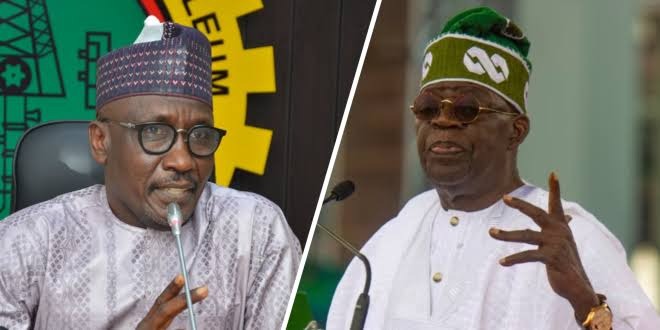The federal government is battling to contain and stabilise the pump price of premium motor spirit (PMS) after the
removal of subsidy on May 29, 2023 sent prices skyrocketing in response to market forces, naira depreciation, and rising cost of crude oil in the international market.
The petrol pump price has risen twice since subsidy was removed, moving from N185 to over N500 in May, and later to N617 in July, thus leading to a cost-of-living crisis in Nigeria.
In a related development, the Kenyan government temporarily reversed subsidy removal in the East African country following outcry from the populace.
President Bola Tinubu, yesterday, gave assurance that the government will implement measures to sustain the existing pump price of PMS in the nation. He affirmed that there will be no price hike in any region of the country
However, he also said the country will not revert its stance on subsidy removal.
Presidential spokesman, Ajuri Ngelale, who disclosed this to State House correspondents, said the official stance is that there will be no price increase at present.
According to him, the president’s conviction is rooted in the belief that the current pricing can be maintained while addressing the inefficiencies within the midstream and downstream petroleum sector, without a policy reversal on deregulation.
The president further stated that the organised labour’s threat of an unannounced strike was premature in the light of these developments.
Ngelale said the president was intent on maintaining competitive tension to ensure that no single individual or organisation dominates the sector and that the government would address the inefficiencies in the midstream and downstream petroleum value chains so that the price can be stabilised.
The presidential spokesman argued that the cost of petrol is still much cheaper in Nigeria than in other West African countries.
Ngelale stated: “Mr. President wishes to assure Nigerians following the announcement by the NNPC Limited just yesterday that there will be no increase in the pump price of petroleum motor spirit anywhere in the country.
“We also wish to affirm that the president is determined to maintain competitive tension within all sub sectors of the petroleum industry.
“The market has been deregulated. It has been liberalised and we are moving forward in that direction without looking back,” he said.
Ngelale presented a graphic chart to compare the prices of PMS in Nigeria and other West African nations.
He said: “Senegal at pump price today of N1,273 equivalent per litre, Guinea at N1,075 per litre, Côte d’ Ivore at N1,048 per litre equivalent in their currency, Mali N1,113 per litre, Central African Republic N1,414 per litre, Nigeria is presently averaging between N568 and N630 per litre.
“We are presently the cheapest, most affordable purchasing state in the West African sub-region by some distance. There is no country that is below N700 per litre.”
He further pointed out that PMS consumption in the country had dropped from 67 million litres per day to 46 million litres per day.
According to him, Nigeria is not yet at the end of the tunnel. However, he asked citizens to be patient with the government even as he pledged that the Tinubu administration will be transparent with Nigerians on issues around fuel administration.
“And as we promised from the beginning, we will be open with Nigerians, and we are ready to show you exactly what it is that our nation is facing with respect to the illiquidity in the market in terms of foreign exchange, as a result of what is now known to have been a gross mismanagement of the Central Bank of Nigeria over the course of several years preceding this time,” he said.
Kenya Reinstates Fuel Subsidy For 30 Days
Meanwhile, the Kenya government reinstated a small subsidy to stabilise retail fuel prices for the next 30 days, in a reversal of government policy after public anger over the high cost of living.
The Energy and Petroleum Regulatory Authority (EPRA) said late on Monday that the maximum retail price of a litre (0.26gal) of petrol would remain constant at 194.68 shillings ($1.35), shielding consumers from an increase of 7.33 shillings ($0.05), which the government will shoulder through a price stabilisation fund.
In Nigeria, analysts believe the announcement by the Nigerian National Petroleum Company Limited (NNPCL) that it is not planning to increase the retail price of petroleum is indicative of the federal government’s plan to re-introduce some sort of petrol subsidy.
A highly reliable source told LEADERSHIP that although there has not been any official confirmation to that effect, the rumour is rife that the government is contemplating reconsidering the subsidy regime.
He said the move is to arrest the escalating pump price of petrol which has taken a toll on the cost of living of the masses.
The source said the action is the only available option left for the government at the moment given that it has no control of crude oil in the international market, which is the key determinant that translates into cost of refined products imported into the country.
Commenting on the development, the CEO of Centre for the Promotion of Private Enterprise (CPPE), Dr. Muda Yusuf said, “This is what I think will happen, no matter if the exchange increases international oil price, they will maintain the current price.
“Citizens have been pushed to the limit, an unbearable point. The citizens cannot bear any further fuel price increment.”
Also, a highly reliable source told LEADERSHIP that, although there has not been any official confirmation to that effect, the rumour is rife that the government is contemplating returning to the subsidy regime.
He said the move is to arrest the escalating pump price of petrol which has taken a toll on the cost of living of the masses.
The source said the action is the only available option left for the government at the moment given that it has no control of crude oil in the international market which is the key determinant factor that translates into cost of refined products which is imported into the country.
Earlier, the Nigerian National Petroleum Company Limited (NNPCL) had said it is not planning to increase the retail price of petroleum.
The oil firm said this in a statement posted via its official X platform on Monday night.
The NNPCL made this known in reaction to reports in the media that the company was set to raise petroleum pump prices from the current N617 per litre to between N720 and N750 in the coming weeks.
But in its reaction on Monday, the NNPCL said it has no intention to increase its petrol pump prices as widely speculated.
The NNPCL had in May begun adjustment of pump prices of fuel due to the removal of petroleum subsidy to allow market forces to determine prices.
In Nigeria, the exchange rate, which reached an all-time high of N950 at the parallel market, has also witnessed significant increases.











